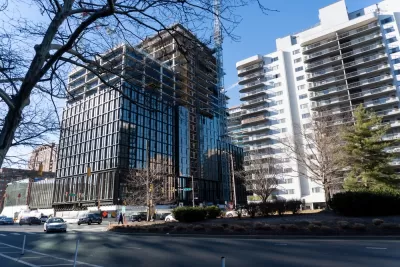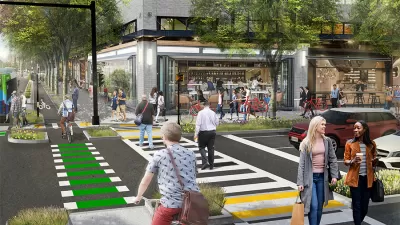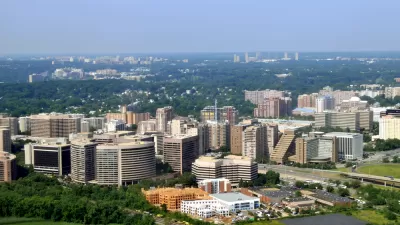The company is pausing construction on its much-anticipated second headquarters in Arlington, Virginia.

On the heels of massive job cuts, Amazon has halted construction on its sprawling ‘HQ2’ campus in Arlington, Virginia. According to an article by Matt Day in Bloomberg, the first phase of the project, which is almost complete, will go forward as planned. The moratorium affects three proposed 22-story office towers and the designy Helix building.
According to an unnamed source, “Amazon and JBG Smith Properties had for months been discussing modifying the PenPlace plans, in part to speed construction of some elements to meet commitments the company made to provide community benefits.” Now, “In an extended delay, Amazon will likely have to modify those arrangements. Plans for the site approved by the county require the company to meet construction and permitting milestones by April 2025, unless the officials grant an extension.”
The complex, first announced in 2017, created a furious bidding war between cities hoping to attract jobs and economic development. Arlington and other Virginia entities pledged $800 million in tax breaks and infrastructure improvements, ultimately winning the project and a projected 25,000 jobs. “But the construction moratorium will delay the online retailer’s full arrival at its biggest real estate project, and could create headaches for local developers, as well as construction and service workers banking on Amazon’s rapid expansion.”
FULL STORY: Amazon Pauses Construction on Second Headquarters in Virginia as It Cuts Jobs

Study: Maui’s Plan to Convert Vacation Rentals to Long-Term Housing Could Cause Nearly $1 Billion Economic Loss
The plan would reduce visitor accommodation by 25,% resulting in 1,900 jobs lost.

North Texas Transit Leaders Tout Benefits of TOD for Growing Region
At a summit focused on transit-oriented development, policymakers discussed how North Texas’ expanded light rail system can serve as a tool for economic growth.

Why Should We Subsidize Public Transportation?
Many public transit agencies face financial stress due to rising costs, declining fare revenue, and declining subsidies. Transit advocates must provide a strong business case for increasing public transit funding.

How to Make US Trains Faster
Changes to boarding platforms and a switch to electric trains could improve U.S. passenger rail service without the added cost of high-speed rail.

Columbia’s Revitalized ‘Loop’ Is a Hub for Local Entrepreneurs
A focus on small businesses is helping a commercial corridor in Columbia, Missouri thrive.

Invasive Insect Threatens Minnesota’s Ash Forests
The Emerald Ash Borer is a rapidly spreading invasive pest threatening Minnesota’s ash trees, and homeowners are encouraged to plant diverse replacement species, avoid moving ash firewood, and monitor for signs of infestation.
Urban Design for Planners 1: Software Tools
This six-course series explores essential urban design concepts using open source software and equips planners with the tools they need to participate fully in the urban design process.
Planning for Universal Design
Learn the tools for implementing Universal Design in planning regulations.
Ascent Environmental
Borough of Carlisle
Institute for Housing and Urban Development Studies (IHS)
City of Grandview
Harvard GSD Executive Education
Toledo-Lucas County Plan Commissions
Salt Lake City
NYU Wagner Graduate School of Public Service





























